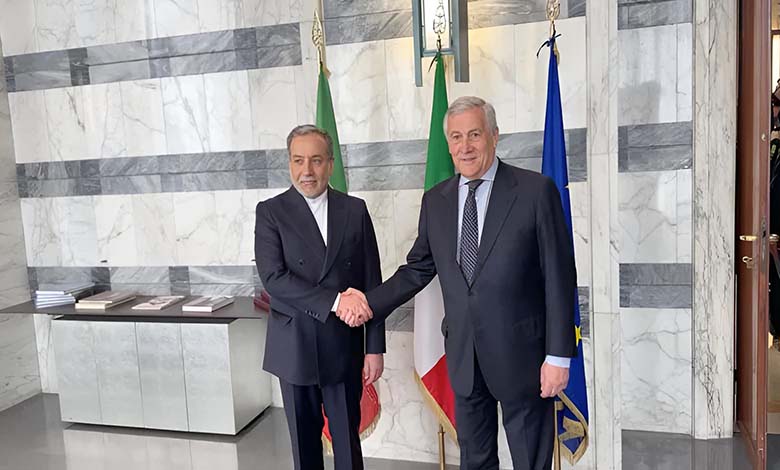Iran Nuclear Talks Return to Rome… Fifth Round Overshadowed by Doubt

The nuclear negotiations between Iran and the United States return to Rome this Friday for a fifth round, once again mediated by Oman. Yet expectations remain low, as talks continue to stall over the contentious issue of uranium enrichment.
Launched on April 12, these discussions mark the highest level of contact between Tehran and Washington since the 2015 international nuclear agreement, from which the United States withdrew in 2018 under President Donald Trump. Trump then reinstated sanctions under a “maximum pressure” strategy, which the current administration is now seeking to revise by negotiating a new deal. Meanwhile, Iran hopes for sanctions relief to alleviate its struggling economy.
-
Are the UAE Playing a Mediation Role Between Iran and the United States?
-
Iran warns Israel and the United States of “escalation beyond control”
A Sticking Point: Uranium Enrichment
The main point of contention remains uranium enrichment. U.S. envoy to the Middle East, Steve Witkoff, stated that the United States “cannot allow even one percent of enrichment capacity.” Iran, however, defends its right to a “civilian” nuclear program and rejects this condition, arguing it violates the international agreement.
Supreme Leader Ali Khamenei declared that Iran “does not wait for anyone’s permission” to enrich uranium, expressing doubt that the talks with the U.S. would yield “any result.”
On the eve of the negotiations, Iran announced it was open to “further inspections” of its nuclear facilities. Foreign Minister Abbas Araghchi told state TV, “We are confident in the peaceful nature of our nuclear program. Therefore, we have no problem in principle with more inspections and transparency.”
-
New Talks – United States and Iran Revive Nuclear Agreement Negotiations Once Again
-
The United States will sanction more than two dozen people and entities about Iran’s nuclear
Nevertheless, Araghchi acknowledged that “fundamental differences” with the United States persist, warning that if Washington insists on preventing Iran from enriching uranium, “there will be no agreement.”
Iranian political analyst Mohammad Marandi told AFP that Iran “will not give up the right to enrich uranium under any circumstances.” He added, “If the U.S. expects Iran to stop enrichment, there will be no deal. It’s that simple.”
During a Senate hearing on Tuesday, U.S. Secretary of State Marco Rubio said Iran views uranium enrichment as a matter of “national pride” and “deterrence.”
-
Energy Investments: Iran’s New Card to Woo Trump and End Sanctions
-
Trump’s Pressure Pushes Iran to Accept U.S. Demands on Nuclear File
Nuclear Context and International Pressure
The 2015 deal capped uranium enrichment at 3.67%. However, Iran is now enriching up to 60%, according to the International Atomic Energy Agency (IAEA), nearing the 90% threshold required for military-grade material.
In response to the U.S. withdrawal from the accord—originally signed by Iran, France, the UK, Germany, China, and Russia—Iran has gradually stepped away from its obligations.
Western nations and Israel, believed to be the Middle East’s only nuclear power, suspect Iran of pursuing a nuclear weapon—an accusation Tehran consistently denies, insisting its nuclear program is strictly for civilian purposes.
-
Iranian Interests Behind the Coordination Framework’s Persistence in Expelling U.S. Forces from Iraq
-
Nuclear Negotiations: U.S. Red Lines and Iran’s Firm Response
CNN reported on Tuesday, citing anonymous officials, that Israel is preparing to strike Iranian nuclear facilities. In a letter to UN Secretary-General António Guterres, Araghchi warned that if Israeli forces target Iran’s nuclear infrastructure, “the U.S. government… will bear legal responsibility.”
More than 17,000 people work in Iran’s nuclear sector, including in energy and medicine, according to Atomic Energy Organization spokesman Behrouz Kamalvandi. He noted that countries such as the Netherlands, Belgium, South Korea, Brazil, and Japan enrich uranium without possessing nuclear weapons.
-
U.S. Sanctions Target Iranian Gas and Oil Shipping Tycoon
-
Iran May Accept a Deal Limiting Its Nuclear Program if Trump Doesn’t Withdraw Again
Ahead: IAEA Meeting in June
Friday’s meeting in Rome precedes a scheduled IAEA board meeting in June in Vienna, where Iran’s nuclear activities will be a key agenda item.
Although largely defunct, the 2015 deal remains technically valid until October. It allows for the automatic reinstatement of sanctions should Iran fail to meet its commitments.
In this regard, French Foreign Minister Jean-Noël Barrot stated last month that France, Germany, and the UK “will not hesitate for a moment” to reimpose sanctions if European security is threatened by Iran’s nuclear program.












